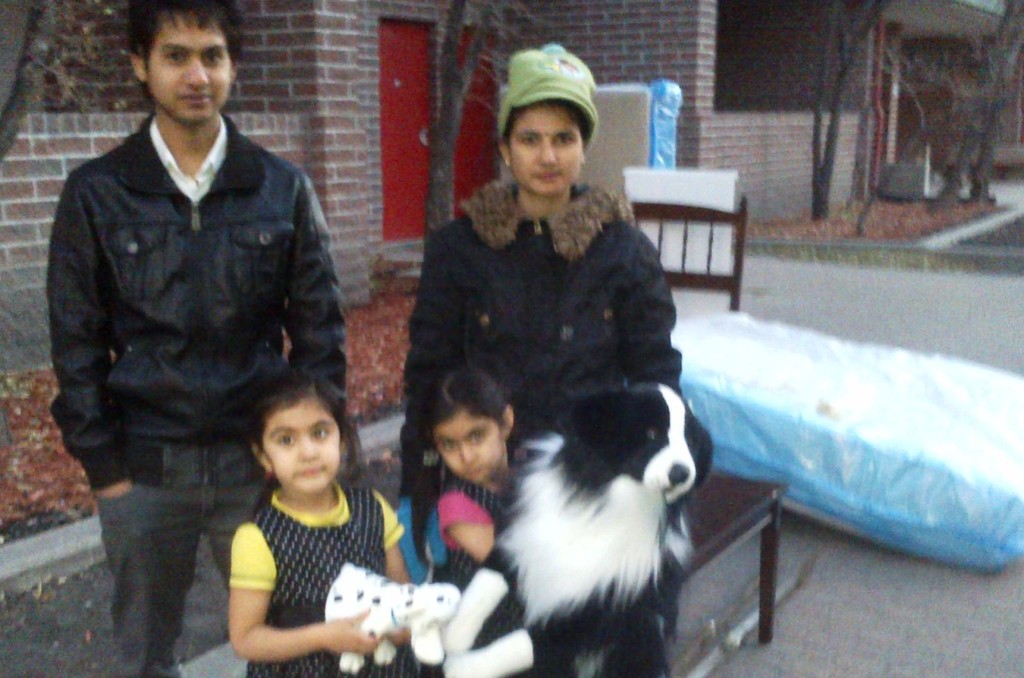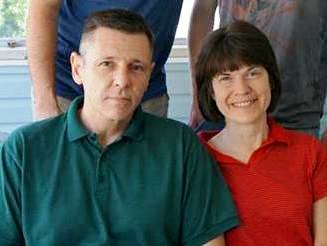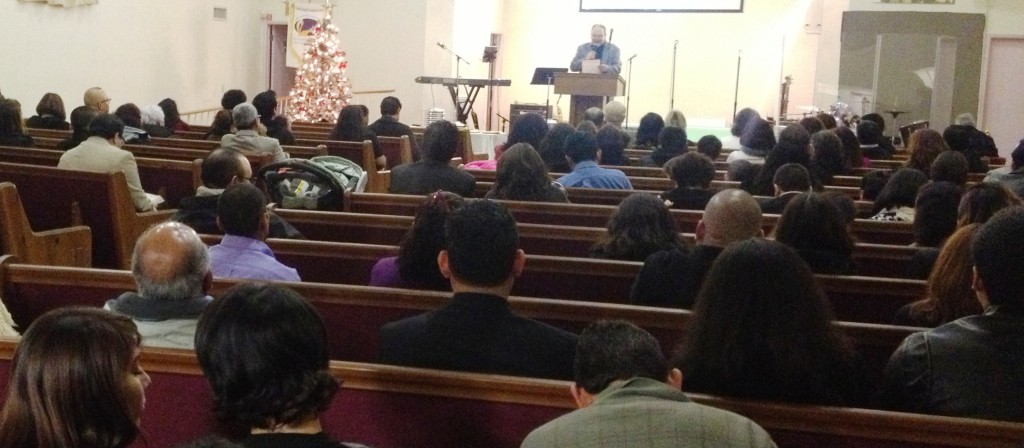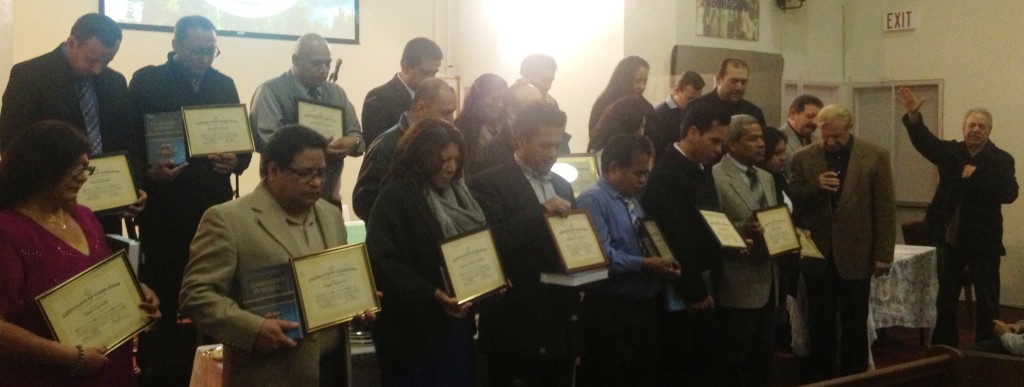Congratulations to Alan and Carolyn Redmond (Alan pastors GCI’s church in Winnipeg, Manitoba, Canada). They added a new grandson on December 14 when Kian was born to their son Stephen and his wife. Kian’s three-year-old brother Finn now has a little brother!
Year: 2014
Hands of Hope
This update is from Charles Norris who coordinates Hands of Hope, an outreach ministry of GCI’s congregation in Winnipeg, Manitoba, Canada.
In January of 2000, several of us attending the Winnipeg church began reaching out to citizens of Winnipeg through a World Vision sponsored church network called NeighbourLink. It soon became apparent that over 80% of the requests for help were for basic household furniture. No one appeared to be able and willing to help people meet this need.
With assistance from my wife Sandra, we began delivering tables and chairs from our home and from the homes of other members to those requesting help. In 2002, with help from our pastor Alan Redmond, a registered charity called Hands of Hope was formed. Today, Hands of Hope responds to about 100 calls plus many more emails every day. Two paid staff now coordinate about 70 volunteers in picking up and delivering furniture to a great variety of people in need.
Winnipeg has over 70,000 people of aboriginal descent. A high percent live in very poor circumstances. Many more are moving into the city every year from remote reservations. Over 16,000 people immigrate to Manitoba every year—many coming with no extra money. Many women are fleeing abusive relationships. Almost all the mental hospitals were closed years ago, putting patients out into the community where they often fare very poorly. Many elderly people find themselves with only the hard floor to sleep on when their beds are infested over and over again with bedbugs.
One 75-year old woman with learning difficulties was discovered to be living in a dilapidated bug- and mouse-infested rooming house with no bed, furniture, or pots to cook with. We gave her a bed, blankets, sheets, chairs, pots, dishes and lamps. She was very grateful. There didn’t appear to be anyone concerned and able to help her. When she moved into a much better apartment, Hands of Hope continued to help her. She is over 80 now and still calls Hands of Hope to ask for items.
We often help five or six families a day. I tell them, “This is what Jesus would do!” In the past 14 years, we’ve helped over 60,000 people—close to 10% of Winnipeg’s population! Ministry employees and volunteers get friendly waves and smiles as they drive down the city’s streets.
A 67-year old woman living under a bridge came to Hands of Hope asking for dry shoes and a coat last February. We gave her shoes plus blankets and food. She is now living in a warm apartment well furnished by Hands of Hope and is very grateful.
One recent immigrant attending the Winnipeg congregation with his wife and teen-age son has been eagerly volunteering for several years. He says, “It’s my job!” Over 15 beneficiaries of Hands of Hope attend our church services at present.
This service to the community, we believe, is a great way to put into practice what Jesus said: “Love your neighbor as yourself.”
Death of Ollie Baker
We are saddened to learn of the death of Ollie Baker, senior pastor of the GCI church in Pine Bluff, Arkansas. Here is an update from Ollie’s district pastor, Mike Horchak.
Pastor Ollie Baker died quite unexpectedly. He had fallen in his home and apparently died from a blow to the head.
Ollie was loved by everyone and was a very caring pastor. His death is a shock to his congregation. Please pray for them. Also pray for his family of nine children and their families. Ollie’s wife preceded him in death.
Please also pray for Kathy Houston. She has been assisting Oliver as a pastor-in-training for the last two years. She will now be taking on full pastoral responsibilities.
Ollie’s funeral is scheduled for January 18.
Is God a family?
Dear Brothers and Sisters in Christ,
 I’m sometimes asked why we no longer refer to God as a “family.” Isn’t that term appropriate, given that there is a Father and a Son who are bringing “many sons to glory”? My answer is that whereas the analogy of God as a family works at some levels, we must be very careful because it can lead in directions that distort the biblical revelation of the one God who is Father, Son and Holy Spirit.
I’m sometimes asked why we no longer refer to God as a “family.” Isn’t that term appropriate, given that there is a Father and a Son who are bringing “many sons to glory”? My answer is that whereas the analogy of God as a family works at some levels, we must be very careful because it can lead in directions that distort the biblical revelation of the one God who is Father, Son and Holy Spirit.
The analogy of God as a family can be used in a limited way to indicate that just as there are relationships between family members, there are relationships in the triune God. However this analogy is easily misunderstood as indicating that just as in a family there are separate persons who each have their own being, so God is made up of persons with separate beings.
But that is not the case. What is true of human relationships in families is not necessarily true of God, who is not a creature. While there is a triune relationship within God’s one being, that relationship is not between separate beings. The three “persons” of the Trinity, through their absolutely unique relationships, constitute the one being of God in a way that is quite unlike a human family.
The uncreated God cannot be explained in terms of a created human family. Trying to do so amounts to mythology and even idolatry.
Most of us probably are familiar with the Hebrew word Elohim. It is one of several names used for God in the Old Testament. In our former teaching, we mistakenly claimed that Elohim is a “uniplural” noun—like the noun “family.” Following this line of reasoning, we erroneously concluded that there are two separate Gods (Father and Son), comprising a “God family.”
From the Akkadians and Egyptians to the Greeks and Romans, pagan religions have taught a plurality (pantheon or family) of gods. The Greeks even constructed a family tree for their pantheon. [1] This pagan conception is known as polytheism (many gods, like the pantheon of Egyptian gods pictured below), or bitheism or ditheism in the case of two gods.
In contrast to the polytheistic misconceptions of paganism, God revealed himself to Israel as one (single, exclusive) God. He commanded his people: “You shall have no other gods before me” (Exodus 20:3). “Before me” is literally, “before my face”—a Hebrew idiom meaning “beside me” or “in addition to me.” [2] Though Elohim is a plural noun, it was never understood as a reference to many gods, and certainly not a reference to a family of gods.
The pantheon of gods in pagan religions ruled the realm of the gods, the supernatural and, ultimately, the human world. Typically one of these gods was designated head of the pantheon and, like the other gods, would have at least one consort (female partner). But God forbade Israel to think of him in these polytheistic and sexual terms. Yahweh definitely is not the head of a pantheon. He has no consort. There are no other gods in his presence [3]. Therefore, Moses proclaimed: “Hear , O Israel, the LORD [Yahweh] our God [Elohim], the LORD [Yahweh] is one” (Deuteronomy 6:4).
Old Testament Hebrew does not support the idea of a “God family.” The nouns used for God’s names and titles are coupled with singular verbs. For example, it is said in Genesis 2:7 that “the Lord [Yahweh—a singular noun] God [Elohim—a plural noun] formed [a singular verb] a man from the dust of the ground.” Though Elohim is a plural noun, the Bible almost always couples it with a singular verb.
Note, however, that while emphasizing the unity and uniqueness of one God, Elohim does allow for the idea of a plurality of persons in the one Godhead. We see this hinted at in Genesis 1:2, 26: “Now the earth was formless and empty, darkness was over the surface of the deep, and the Spirit of God was hovering over the waters…. Then God said, ‘Let us make mankind in our image, in our likeness…'” This rich linguistic character of Elohim is found only in Hebrew and in no other Semitic languages—not even in Biblical Aramaic. [4]
Note also that, as is true in the English language, Hebrew has both singular and plural nouns. However, quite unlike English, Hebrew is able to specify singular, dual and plural meanings for nouns. [5] For example, in the Old Testament, God is named Eloah (a singular noun) 57 times; he is named Elohim (a plural noun referring to three or more) 2570 times; and he is named Elohiam (a plural noun referring to two) exactly zero times.
The nature and usage of the plural noun Elohim in biblical Hebrew, taken together with the singular verbs that are coupled with it, while allowing for the possibility of some kind of plurality in God, does not allow for separate beings who make up a pantheon (family) of gods. When we add to this the Old Testament’s emphatic teaching that there is only one God, it becomes clear that our former teaching that God is a family of two separate Gods is not biblical. Even though the Hebrew Scriptures hint at a plurality of persons in the Godhead, the notion of there being two separate “god beings” is ditheism (a form of polytheism)—a belief expressly prohibited by God himself.
God is one being with a plurality of what we refer to as divine “persons.” This is why I say we should be very careful in saying that “God is a family.” The truth about the nature of God, which is only hinted at in the Old Testament, is revealed to us fully by Jesus Christ. Given that revelation, we can say with confidence that the Father, Son and Holy Spirit live in a loving, eternal relationship as one Triune God—a relationship in which, by grace, we have been included. This wonderful truth of our participation and inclusion is helpfully explained by Gary Deddo in a two-part article. We published part one last week and you’ll find part two in this issue of Weekly Update.
Your brother in Christ,
Joseph Tkach
PS. For those interested in further reading on this topic, here are the sources I’ve referenced in my letter.
[1] See the chart at http://en.wikipedia.org/wiki/Family_tree_of_the_Greek_gods.
[2] H.D. Spence: The Pulpit Commentary: Exodus Vol. II. Logos Research Systems, S. 131.
[3] Victor Harold Matthews; Mark W. Chavalas; John H. Walton: The IVP Bible Background Commentary: Old Testament. Electronic ed., S. Ex 20:3.
[4] Gustav Oehler: Theology of the Old Testament, p. 88.
[5] E. Kautzch, ed.: Gesenius’ Hebrew Grammar, p. 244.
Crossing Borders mission trip
This update is from Lee Berger, the director of Crossing Borders (part of GenMin’s mission trip ministry).
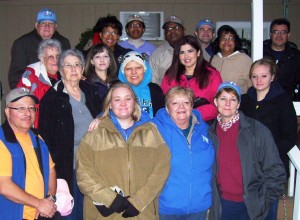 We just completed the 16th Crossing Borders mission trip into Mexico. Here are some highlights:
We just completed the 16th Crossing Borders mission trip into Mexico. Here are some highlights:
- 26 missionaries (some pictured at right) from seven states participated—we sang, danced, hugged, spoke, cooked and shared the love of God from our hearts.
- When we first took shoebox gifts to children in Mexico in 2007, we had 150 boxes. This time we took 600 gift boxes, which translated into hundreds of smiling young faces.
 The shoebox gifts were donated by about 20 churches and other groups from over 10 states. Most of the gifts came from GCI churches while some came from Girl Scouts and non-GCI partner churches.
The shoebox gifts were donated by about 20 churches and other groups from over 10 states. Most of the gifts came from GCI churches while some came from Girl Scouts and non-GCI partner churches.- There were many hand-made gifts this year: over 40 beautiful baby/youth-sized quilts, several warm and cuddly knitted afghans, some toys and greeting cards with personal messages. These personalized gifts were greatly appreciated and treasured.
- For the first time, we connected with GCI members from Mexico. The GCI church closest to the area where we do our mission work (Nuevo Laredo) is three hours away. We were excited that four members from our Guadalajara, Mexico City and Monterrey churches joined us this year. Please pray that God uses future trips as a means for training GCI members from both the U.S. and Mexico.
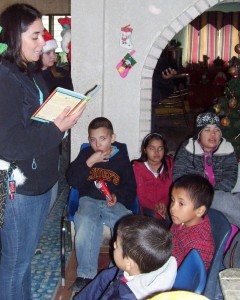 There is much more I could tell you about the wonderful children of God (of all ages) we served and the life-changing experiences they had on this trip. It is exciting to be part of a ministry that continues to grow and change as we follow the Spirit’s lead in sharing God’s love. A big “muchas gracias” to the churches and others who helped! With your assistance we are able to share shoebox gifts and God’s love with many wonderful people.
There is much more I could tell you about the wonderful children of God (of all ages) we served and the life-changing experiences they had on this trip. It is exciting to be part of a ministry that continues to grow and change as we follow the Spirit’s lead in sharing God’s love. A big “muchas gracias” to the churches and others who helped! With your assistance we are able to share shoebox gifts and God’s love with many wonderful people.
Our next Crossing Borders mission trip is scheduled for June 21-30, 2014. We’d love to have you join us. For details, go to www.cbmission.org or phone me (Lee) at 903-746-4463.
Todd Crouch
Todd Crouch (pictured at right with his wife Denise) is living one of his life’s dreams. “For as long as I can remember, even from age four or five, I have always wanted to know God and to really understand the Bible. I even talked to my Methodist minister about becoming a pastor.” Todd’s dream came true and he now pastors three GCI congregations: Wheeling, West Virginia; Washington, Pennsylvania; and Cambridge, Ohio.
Growing up in the small town of Speers, Pennsylvania, Todd’s first contact with GCI was through a cousin. “He gave me a subscription to The Plain Truth as a Christmas gift in 1974. I read it and for some reason it struck a chord…there was a real zeal. I appreciated that the WCG encouraged people to look into Scripture and that Christianity was meant to be something engaging that would change us.” Todd began attending WCG in 1981 in Belle Vernon, Pennsylvania (now the Mt. Pleasant congregation), and was baptized later that year.
Todd met his wife Denise at a church function. She was attending the Washington, Pennsylvania congregation. “In 1983 we got married and we moved to Bentleyville which is where we still live. It’s about halfway between our two families. We attended the Washington church with family.”
Todd and Denise have two sons, both married. David and his wife Elissa live in Moore, Oklahoma. David works as a SharePoint Administrator for Chickasaw Nation Industries. Elissa is a meteorologist for Weather News in Norman. They attend the Oklahoma City church. No grandkids yet.
“Our youngest son Jonathan is an officer-ranger with the Pennsylvania Department of Natural Resources and Conservation policing the state parks. His wife Jill is a forensic scientist with the Pennsylvania State Police. Jonathan is a member of the Washington, Pennsylvania church. Jill attends the church she grew up in. No grandkids yet.”
Todd, who worked in advertising, was asked to become the bi-vocational associate pastor of the Mt. Pleasant congregation in 1999. “I’m not sure what led to it other than at that time when many were leaving our fellowship, we stayed. We attended new pastors’ training at HQ in 2000. In 2005, Todd was hired full time and became the senior pastor of the three congregations.
What Todd enjoys most about being a pastor is, “Telling others about Jesus and having conversations with people about Jesus. I also love fellowship and worship. Pastors have the opportunity to participate with Jesus in ministering in many ways. You are bound up with the lives of so many and you experience so much through these relationships. Building relationships with other Christian pastors and churches is also a big plus.”
His most memorable moment as a pastor happened in Palm Springs during the International Pastors’ Conference, “when I first realized that Jesus had not left his humanity in the grave and is thus still ‘one of us’ and always will be.”
Speaking about GCI, Todd said, “God has given us a unique history and story to be a part of. I also like that so many of us know one another and have mutual friends. Also there is an intangible quality with GCI that is hard to define, but it’s there. It’s the desire, I think, to be transformed by the Holy Spirit with the focus on Jesus. We desire to know Jesus deeply and to see lives changed as we understand what Jesus has done for us all.”
Todd loves to share what God is doing with the three small churches he pastors. “We have a radio program called Fountain of Life. It is heard on a small radio station here in Washington and we have an ever-growing audience of online listeners in over 310 cities in America and all over the world at www.rkpradio.com. This shows us that Jesus uses our loaves and fish as we bring them to him.”
When does Todd feel closest to God? “In times of worship, both privately and when the church comes together.”
Jesus’ Acceptance, part 2
Here is the second part of a two-part article by Gary Deddo. For part one, click here.
In part one of this article, we saw that Jesus loves and accepts all people. We then observed that he invites those he has accepted to follow him and then discerns their personal responses. As the Bible shows, there are consequences for those responses, which we will now address.
Jesus’ discernment of the various kinds of responses made to him is evident at many points in Scripture. His parable of the sower and the seeds (the seeds being his word) makes this obvious. There are four distinct soils, and only one represents the receptive response that Jesus is looking for. On numerous occasions, Jesus talks about receiving or rejecting him, his words/teaching, his heavenly Father and his disciples. When a number of disciples turned away and left him, Jesus asked whether his twelve disciples would leave him as well. Peter famously replies, “Lord, to whom shall we go? You have the words of eternal life” (John 6:68).
Jesus’ initial initiative towards people is expressed in his invitation to “come, follow me” (Mark 1:17). There is a difference between those who follow and those who do not. Jesus likens those who follow to those who act on an invitation to a wedding and contrasts them with those who refuse the invitation (Matthew 22:4-9). In like manner, a difference is noted in the refusal of the elder son to join in the feast celebrating his younger brother’s return, despite his father imploring him to come in (Luke 15:28).
There are strict warnings to those who not only do not follow Jesus but who actively reject his invitation to the extent of preventing others from following him, some even plotting to have Jesus executed (Luke 11:46; Matthew 3:7; 23:27-29). These warnings are severe—indicating what the person issuing them does not want to happen, not what they hope will happen. Warnings are given to those whom we care about, not to those for whom we have no concern. The same love and acceptance is exhibited towards those who accept Jesus and those who reject him. However, such love would not be loving if it then failed to note the difference of response and the corresponding consequences.
Jesus welcomes and invites all to respond in a receptive way both to him and to what he offers, which is the reign of the kingdom of God. Though the net is cast wide and the seed is sown everywhere, receiving, trusting and following him call for a particular response. Jesus likens it to the reception of a child. He calls such receptivity faith/belief or trust in him. It includes repenting of putting one’s ultimate trust in anyone or anything else. It is summed up in worshiping the Father through the Son and in the Spirit. The gift is offered freely and extended to all. No pre-conditions are set out to limit or restrict who might benefit from it. However, the reception of the freely given gift always involves a cost to the recipient. That cost is to give up one’s entire life and hand it over to Jesus and the Father and the Spirit with him. The cost is not something paid to Jesus to enable or incline him to give himself to us. It is the cost of emptying our hands and hearts to receive him for who he is, our Lord and Savior. What is freely given is costly to us to receive because it involves dying to the old and corrupted self in order to receive new life from him.
The cost to us to receive God’s free grace is referred to throughout Scripture. In the Old Testament, we are said to need both new hearts and new spirits that God himself will one day give! In the New Testament we are told that we need to be born again from above, that we need new natures, that we must stop living for ourselves and begin living under the Lordship of Christ, that we must die to our old natures, that we are to become new creations, that we are to be regenerated, that we are being renewed according to the image of Christ, the new Adam. The day of Pentecost indicates not only God’s sending of his Spirit to indwell his people in a new way, but our need to receive and be indwelt and filled by his Holy Spirit, the Spirit of Jesus, the Spirit of life.
Jesus’ parables indicate that the response he is looking for, the response that indicates the reception of what he offers us involves a cost to us. Consider the parables of the pearl of great price or the purchase of a field in which there is a treasure. Those who respond appropriately must give up all they have to receive what they have found (Matthew 13:44, 46). Those who place other things as a priority, whether they be lands or home or family, are not receiving Jesus and his benefits (Luke 9:59, Luke 14:18-20).
Jesus’ interactions with people indicate that following him and receiving all his benefits calls for the abandonment of anything we might value above Jesus and his kingdom. That includes abandoning the pursuit and possession of material wealth. The rich ruler did not follow Jesus because he could not part with his goods. Consequently he was unable to receive the good that Jesus offered him (Luke 18:18-23). Even the woman caught in adultery was called to set out in a different direction of life. Receiving forgiveness was to be followed by her sinning no more (John 8:11). Recall the man at the pool. He had to be willing to leave behind his place at the pool as well as his diseased self. “Get up! Pick up your mat and walk” (John 5:8).
Jesus welcomes and accepts all but a receptive response to Jesus does not leave anyone where Jesus finds them. Jesus would not be loving if he simply left them in the condition in which he first encountered them. He loves us too much simply to leave us alone as though he merely empathizes with us or feels sorry for us. No, his love is a healing, transforming, life-changing love.
In sum, the New Testament consistently declares that the response to the free offer that Jesus makes of himself, including all that he has for us, involves denying (dying to) ourselves. It involves giving up our pride, our confidence in ourselves, in our religiousness, in our gifts and abilities including our ability to manage and give ourselves life. In that regard, Jesus shockingly declares that compared to following him we must “hate our father and mother.” But more than this, following him calls for hating our own life—the false idea that we can give life to ourselves (Luke 14:26-27). When we accept Jesus, we cease living for ourselves (Romans 14:7-8) because we belong to another (1 Corinthians 6:18). In that sense, we are “slaves of Christ” (Ephesians 6:6). Our lives are completely in his hands, under his provision and direction. We are who we are in relationship to him. Because we are united to Christ, “it is no longer I who live, but Christ who lives in me” (Galatians 2:20 ESV).
Jesus does accept and welcome one and all. He died for all. He is reconciled to all. But he does this as our Lord and Savior. His welcome and acceptance are an offer, an invitation that calls for response, for receptivity. And that acceptance and receptivity necessarily involves receiving exactly what he has to offer according to who he is. Nothing more and nothing less. This means that responding to him will involve repentance, getting rid of anything that blocks receiving from him what he has to offer, that blocks communion with him and the enjoyment of life in his kingdom. Such a response is costly to us—but a cost well worth it. For in dying to our old selves, we receive a new self. We make room for Jesus, receiving with emptied hands his life-transforming, life-giving grace. Jesus accepts us wherever we are in order to take us to where he is going, which is to be with his Father in the Spirit now and for all eternity as his healed, whole, regenerated children.
Who would want to be included in anything less than that?
Spanish-speaking leader development
This update is from GCI district and church pastor and church planter Heber Ticas.
 For the past two years the Spanish-speaking district that I lead in Southern California has been participating in a leadership/pastoral development program. We invited both established and emerging young leaders from our seven congregations to attend ten intensive daylong training sessions held over a two-year span.
For the past two years the Spanish-speaking district that I lead in Southern California has been participating in a leadership/pastoral development program. We invited both established and emerging young leaders from our seven congregations to attend ten intensive daylong training sessions held over a two-year span.
Dan Rogers, Mike Morrison, Lorenzo Arroyo (shown teaching below), Ben Escalante, Manuel Ochoa, Jose Luis Escalante and I provided teaching, including introduction to the Old and New Testaments, Trinitarian theology and incarnational missional ministry.
It is with great joy and expectation that I report that 21 participants graduated from the program last month (see picture below). On December 7 we held a district-wide gathering where participants were recognized with diplomas presented by Dr. Dan Rogers. It was a great time of fellowship and celebration as we thanked our Lord for his grace over our Hispanic work in this region.
It is my expectation that we will continue to develop emerging leaders with the purpose of sending them to their local congregations for leadership and missional work. I also expect that some in this group will become church pastors, church planters and/or participants in a launch team to plant new GCI Spanish-speaking congregations.
I have set as a goal for our Spanish district to multiply itself to 14 congregations in the next 7-10 years. Please join me in prayer about this goal—thanking our most loving God for his grace with respect to our Spanish work.
Death of Gervaise Amundson
We are saddened to learn of the death of Gervaise Amundson, wife of GCI pastor Don Amundson of Austin, Texas.
Gervaise went home to the Lord on Christmas Eve at around 8:00 p.m. She had been in hospice care for three days following a long battle with Alzheimer’s disease. Her last meal was some ice cream that Don fed to her. It was one of Gervaise’s favorites.
Cards may be sent to:
Don Amundson8114 Shenandoah
Austin, Texas 78753-5735
Mike Swagerty
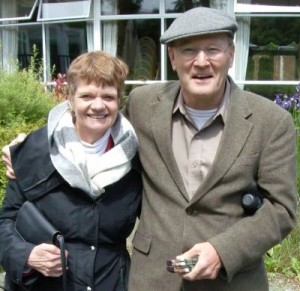
Mike Swagerty’s career track made a radical turn at a young age. He explains: “I have never been convicted as an arsonist, but as a child I am afraid I was a budding pyromaniac. At age eight I started a fire on our farm that nearly burned down all the houses and out-buildings. Needless to say the punishment that was forthcoming basically got me over my ‘fire bug’ ways.” Mike has replaced pyromania with playing cards. “I love to play cards, especially bridge. I have belonged to a Thursday night bridge group for many years.”
Mike, who pastors GCI’s church in Sacramento, California, lives about 100 miles from where he grew up. “I grew up on a peach farm about 11 miles southeast of Modesto. I never moved from birth until college from that farm. After being accepted to college and being ordained a minister at graduation, I simply moved wherever HQ told me to go. My first assignment was in Toledo, Ohio and my last transfer was to Sacramento in 1991.”
At age 15, Mike started listening to The World Tomorrow radio broadcast. “I remember the question on the broadcast that caught my interest: ‘Why were you born?’ This led to booklets, 58 Correspondence Course lessons, magazines and then applying to college after my graduation from high school. I became a baptized member of GCI during my freshman year at Ambassador College in 1964.”
Mike and his wife Sandy will celebrate their 46th wedding anniversary in May 2014. “I met Sandy while we were in college in Pasadena. Funny that we didn’t even date until we were seniors. Our final week was a real whirlwind. We got married on a Sunday. We graduated and I was ordained the following Friday. By Monday we were headed for Toledo, Ohio, our first pastoral assignment.”
Mike and Sandy have two sons. “Terry, our first, was born while we were finishing our stay in Toledo. He was only three weeks old when we traveled to New Jersey. Our second son, Robert, was born in New Jersey. Terry is now 44 and Robert is 40. We have four grandchildren—a boy and a girl from each son. The boys are Jakob and AJ,and the girls are Trinity and Maddie.”
When asked what he enjoys most about being a pastor, make replied: “There’s almost nothing I don’t enjoy—even the paperwork. But my greatest love is sharing the lives of people. I have met so many interesting people over the years and I never get tired of hearing their stories.”
Mike has several stories of his own. “The one that stands out is a baptism in a stream. I was in my suit and didn’t have a bathing suit. So I took off my socks and shoes, and my coat and tie, and rolled up my pants. I was baptizing a lady and her adult daughter. The bottom of this stream was covered with round stones that had moss growing on them. The footing was treacherous. Just as I bent over to lower the daughter into the water, my foot slipped and the whole crotch of my pants tore from one end to the other, leaving me just a bit exposed! Not to be defeated, I tied my coat around my waist like an apron and we finished the baptism. Funny thing, the mother was a seamstress and we went back to her house where she sewed up my pants!
Sandy is a big part of Mike’s ministry. “Besides helping me with office work, visitation and all the normal things pastors’ wives do, Sandy has hosted a women’s small group at our home for 18 years. She has been involved as a singer on the worship team for our entire 22 years here. She has been very much involved with Connecting and Bonding, which is an outreach to ministers’ wives led by Jannice May. Sandy is a prayer warrior, never missing the opportunity to add to her considerable prayer list. She also works as a cashier at Target, where I refer to her as “Mother Teresa,” as she is always a good listener, comfort giver, and prayer partner for all who come through her line.”
When asked what he loves about GCI, Mike shared, “The fellowship and the many friends. We have folks scattered all over the world that we consider friends. I know of no other church denomination that can say this.”
When asked about his passion, Mike said, “My passion right now is to pass along my faith to the next generation. I am very active in the lives of my children and grandchildren. In the last two years I have found a real interest in summer camp. I am part of the team preparing to start a new GenMin camp at Lake Tahoe.”
Mike feels closest to God “in the early morning, and especially in the beauty of his creation. I love my morning time spent with God at around sunrise each day.”



